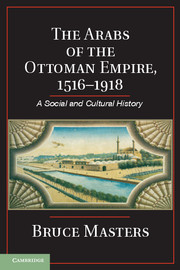Book contents
- Frontmatter
- Contents
- Acknowledgments
- Abbreviations
- Note on Transliteration
- Introduction
- 1 The Establishment and Survival of Ottoman Rule in the Arab Lands, 1516–1798
- 2 Institutions of Ottoman Rule
- 3 Economy and Society in the Early Modern Era
- 4 A World of Scholars and Saints
- 5 The Empire at War
- 6 The Tanzimat and the Time of Re-Ottomanization
- 7 The End of the Relationship
- Conclusion For the Faith and State
- Bibliography
- Index
7 - The End of the Relationship
Published online by Cambridge University Press: 05 April 2013
- Frontmatter
- Contents
- Acknowledgments
- Abbreviations
- Note on Transliteration
- Introduction
- 1 The Establishment and Survival of Ottoman Rule in the Arab Lands, 1516–1798
- 2 Institutions of Ottoman Rule
- 3 Economy and Society in the Early Modern Era
- 4 A World of Scholars and Saints
- 5 The Empire at War
- 6 The Tanzimat and the Time of Re-Ottomanization
- 7 The End of the Relationship
- Conclusion For the Faith and State
- Bibliography
- Index
Summary
The consolidation of Ottoman rule over the Asian Arab provinces that began with the Ottoman reoccupation of Syria in 1840 was nearly complete at the start of the reign of Sultan Abdülhamid II (1876–1909). By the end of his reign, new technologies, such as the telegraph and railroad, linked many of the provincial capitals to Istanbul. No place was quite as distant as it once had been. There were nonetheless regions in the Arab lands that seemed alien and distinctly uncivilized to the Ottoman bureaucrats posted there. Underscoring that perception, Arabistan emerged as trope in the Ottoman discourse on civilization and progress. With their gaze fixed on the West, Ottoman would-be modernizers viewed the Arab lands as socially backward, undeveloped economically, and ignorant. In securing his provinces in the east and south, Abdülhamid could rely on an increasingly professional bureaucracy and disciplined officer class. Both included Arabs although they were significantly underrepresented in either in terms of their percentage of the empire’s population. Despite the changes that were occurring, most European observers were unimpressed by the empire’s faltering steps toward modernity. Perceptions of both reform and modernity, it seems, were relative.
Better communication and an expanded bureaucracy facilitated greater surveillance by the state’s security apparatus as independence movements, propelled by ethnically based nationalist ideologies, blossomed in the Balkans and took tentative first steps in Anatolia. The Arabic-speaking population of the empire was not immune from the siren song of cultural nationalism as pride in the glories of the Arabs’ past was a hallmark of the intellectual discourse in the closing decades of Ottoman rule. In contrast to the troubled Tanzimat era for the region, however, Abdülhamid’s reign was spared outbreaks of sectarian violence in the Arab lands. But storm clouds were emerging in the distant Balkans and closer still in southeastern Anatolia.
- Type
- Chapter
- Information
- The Arabs of the Ottoman Empire, 1516–1918A Social and Cultural History, pp. 192 - 224Publisher: Cambridge University PressPrint publication year: 2013



